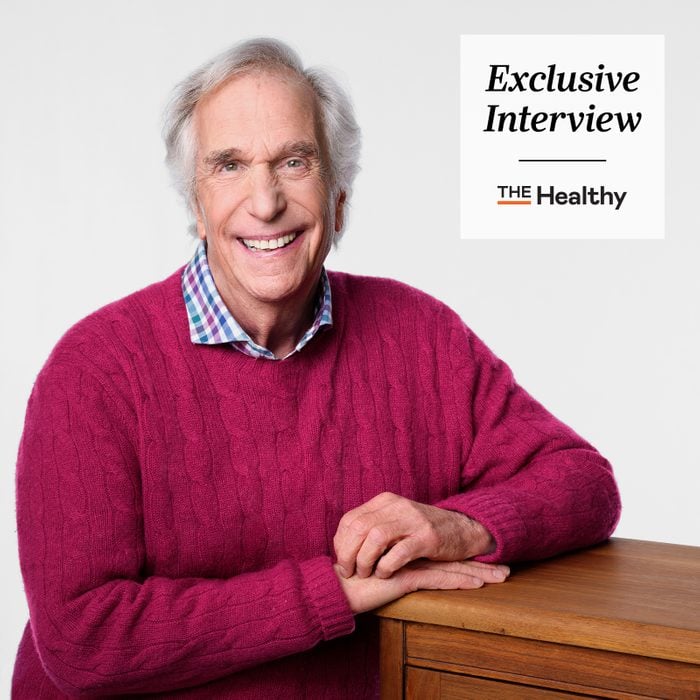Henry Winkler Reveals the Family Health Problem That Opened His Eyes
Updated: May 08, 2023

Henry Winkler dishes on the current season of Barry, staying young after 50 years in show business, and the loved one whose health problem has made him passionate to speak up.
Henry Winkler knows the importance of staying sharp. For almost five decades, Winkler has been delighting audiences with his charismatic performances, starting with his rise to fame in the 1970s as Fonzie on Happy Days, to his Emmy-winning role today on HBO’s Barry. Now 77, Henry Winkler has no plans of slowing down—though he knows that means paying close attention to his health.
Winkler witnessed firsthand how crucial taking care of himself was when he watched his father-in-law develop age-related macular degeneration (AMD)—when he was around the age Winkler is now. To help advocate for the importance of fighting macular degeneration, being proactive about eye health and overall wellness, Winkler is the face of a new campaign bringing awareness to an advanced form of the disease called geographic atrophy (GA).
Henry Winkler spoke with The Healthy @Reader’s Digest about the campaign, what his family’s experience taught him about his own health, and he stays active to keep working.
How Luke Russert Knew It Was Time for a Career Change: ‘There Was Something Missing’
Henry Winkler on geographic atrophy
The Healthy @Reader’s Digest: First I would love to hear a bit about your father-in-law Ed and his experience with macular degeneration.
Henry Winkler: So when I married Stacy [Winkler’s wife since 1978], I was lucky enough to get this wonderfully tall, unbelievably good dentist for a father-in-law. He then became my dentist, and he was just amazing.
Over the years, slowly as I got to know him, he got AMD. His vision started to go and he could no longer work in small spaces, and he had to give up his practice before he wanted to. He was involved in the politics of dentistry. He was on boards. He loved the sociability of traveling and going to the conventions, but he couldn’t do that anymore. I literally watched this powerful, tall man—this wonderful, gregarious, mustached father-in-law of mine, become more introverted and more introverted as it went along.
And what we didn’t know then was that AMD becomes GA, which is geographic atrophy. He couldn’t recognize his grandchildren anymore. He couldn’t pick out his clothing without feeling it and hoping he got the right tweed. He would ask his son if he still had a beard—if his son still had a beard—because he couldn’t see. So all of a sudden, the joy that comes from seeing your world was becoming blurry and diminished, as is the problem with AMD.
21 Habits That Are Making You Age Faster
Henry Winkler on being proactive about his health
The Healthy: I’m curious how his experience affected the way you viewed your own health.
Henry Winkler: Well, let me just tell you, I think it is really important. One of the reasons that I am here is because I understand how important eye health is, and to go and see your doctor. You know, there is a wonderful website, GA Won’t Wait. And I add, neither should you. I think it is so important to make sure that your quality of vision, your quality of the joy of living, you extend it as long as you possibly can by going as quickly as you can to your eye doctor.
Experts Say Most People Who Live to 100 Years Old Share This One Thing in Common
The Healthy: So what are some of the habits you’ve developed to stay proactive about your health?
Henry Winkler: I should exercise more, that’s for sure. I literally put on a backpack when I walk to the kitchen. But really, my eye doctor is one of my heroes. I literally think the man was put on this earth in order to know the eye and to care for the eye. I’m telling you, I honestly mean that, and I get such a great feeling when I go and I get the report back that my eyes have remained the same. My vision is still good. It gives you a sense of wellbeing, just totally.
Experts Say Most People Who Live to 100 Years Old Share This One Thing in Common
The Healthy: How did watching your father-in-law’s life narrow through his experience with macular degeneration impact how you considered your own experience of aging?
Henry Winkler: You know what, that is a great question, and I’ll tell you, I have thought about that since I knew Ed and I knew that his eyesight was diminishing. He would have this machine that enlarged his personal letters that would then project them onto a screen. And that was how he read. And then that didn’t work.
And I have to tell you, if you know somebody [who is] 60 or older and you see that their eyesight is wobbling, if there are wavy lines where there should be straight, where there is a blind spot where there should be a total picture. It scared me. It scared me because you don’t know when it’s coming. It’s irreversible. So if you catch it early, you can try to extend your eye health as long as possible. It puts you on notice to watch.
And it is sneaky. AMD is sneaky because you don’t feel anything. You just can’t see what you did a few days ago and then it progresses. I am an actor, I have to see what I’m reading, where I’m going, who I’m talking to. I want to see my family. When I go fly fishing for trout, I want to see my little fly in the water. All that would be gone. All that would be taken away.
A 103-Year-Old Nun’s 10 Daily Secrets for a Long, Healthy Life
Henry Winkler on cross-generational relationships in Barry
The Healthy: The final season of “Barry” is premiering soon. A big part of Barry’s character is craving connection and guidance from your character, Gene. How important do you think that kind of cross-generational relationship, or the kind of relationship you had with your father-in-law, is for our wellbeing and for our mental health?
Henry Winkler: That is another great, great question. That is a wonderful connection because here’s the thing: To stray a little bit, I’ve always enjoyed visiting the Amish section of Pennsylvania. And if you look at the houses, they’re just added onto hodgepodge with each generation. It takes a village. The cross-generation is almost as vital as blood. You need help, you need advice, you need wisdom, you need the support, you need the joy. And it all comes from one generation to the next. Now connecting it to Barry, I have no shame. The last episodes…take a flashlight with you.
The Healthy: I can’t wait. So finally, my last question for you, do you practice self-care? And if so, how? What are your self-care habits that you can’t skip?
Henry Winkler: Going to the doctor, each doctor, and making sure that my cholesterol is right, making sure that my eyes are right, making sure that my body is right. I am incredibly grateful that I’m still so active and that I’m able to be active. And that only comes from really paying attention and taking care.













